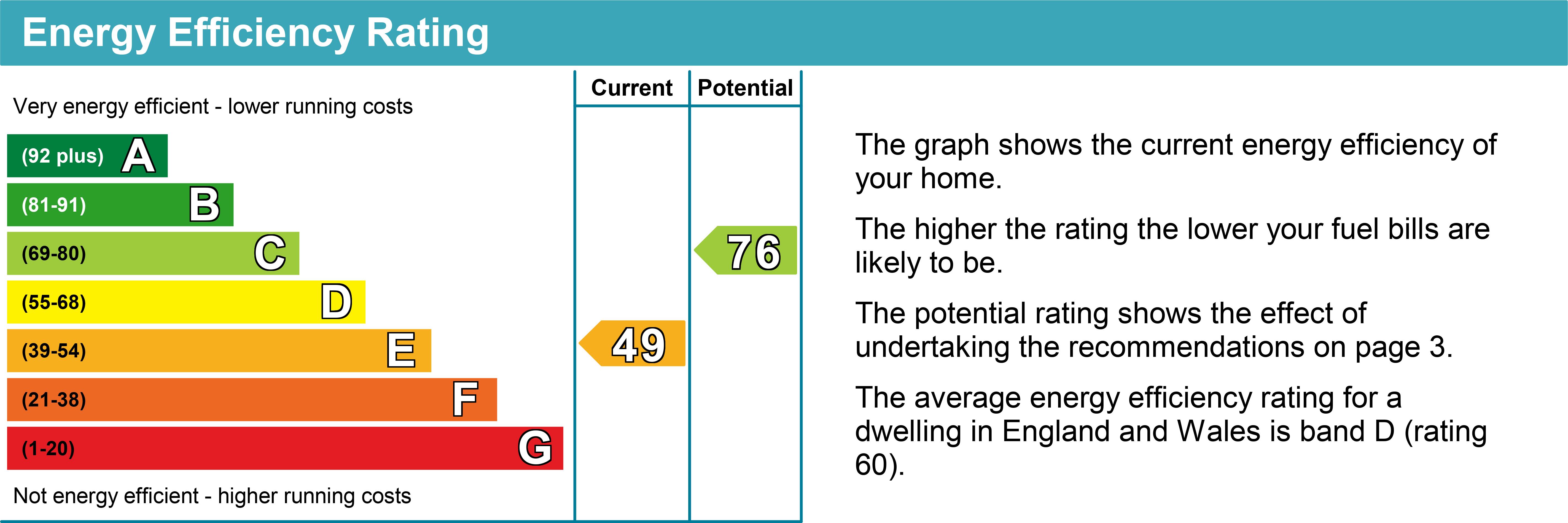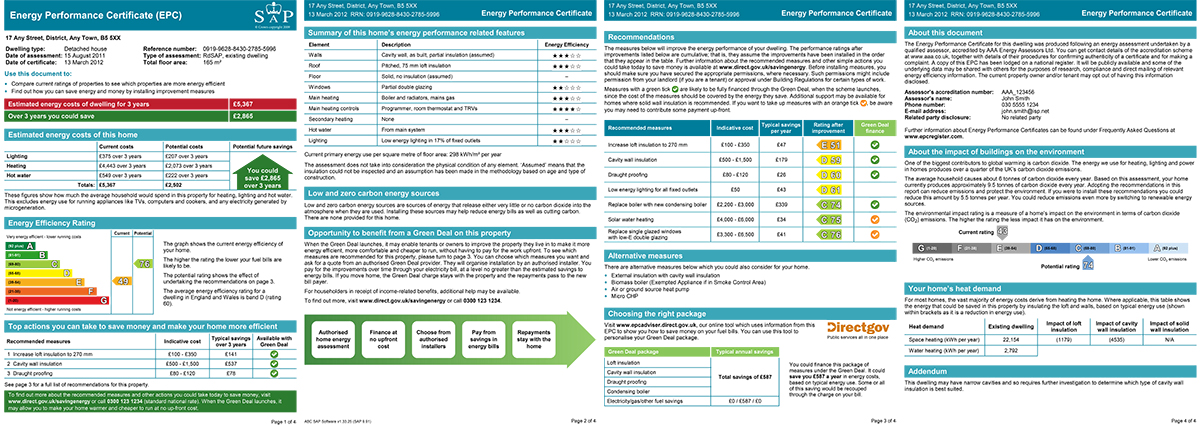The benefits of Energy Performance Certificates for property owners
[edit] Reasons to be EPC-ful.
It’s time for a fresh look at the many ways an Energy Performance Certificate can be beneficial to property owners.
In the same way that Home Reports have become an accepted part of the residential property market so have Energy Performance Certificates (EPCs) become a fundamental tool in the assessment of a building’s essential worth.
The EPC provides a colour-coded and easily understandable rating of a property’s energy usage and its carbon dioxide emissions and, with the Home Report, offers advice on how to reduce carbon footprint, improve the rating – and save money.
This is of increasing importance because, in these energy-conscious and – for many people – cash-strapped times, home buyers are turning to the EPC in the first instance to get an immediate snapshot of what their utility bills are going to be like.
In point of fact, the bare legislative reasons for obtaining an EPC are actually pretty limited and can be summed up as Selling, Renting or Building, in all of which cases the certificate has to be in place before a move is made.
So, before you consider putting a property on the market, letting a home out as a private landlord or re-mortgaging, the energy usage has to be pinned down according to an agreed set of parameters.
What is not so well known is that an EPC can be of considerable worth outwith these regulatory requirements, and can offer valuable guidance on where improvements can be made both on emissions and on costs.
For instance, great numbers of people are looking to home improvements, such as extensions, as an alternative to moving home and an EPC can point the way towards the type of improvement which would create the best value for money.
It is also worth re-certificating post-improvement, so that the upgrades are reflected on the EPC, and a new certificate should be a part of a retrofit assessment.
The certificates can be a deciding factor as part of a grant scheme approval and, if a certificate has expired – its current shelf-life is 10 years – a newer EPC will better reflect current fuel generation practices and costs.
So, it is fair to say that EPCs have, over the years, focused people’s thinking about the profligacy of our energy use, and it is worth considering other ways of moving the little green arrows of current and potential consumption from G up towards A.
The Energy Saving Trust, which holds the public register of EPCs has a wealth of information about how to cut down on our personal impact on the future of the planet, but it also has some snappy, quick fixes for home owners:
- Take back control of the thermostat. By working out when you do and don’t need to heat the property, it is possible to dramatically reduce wastage.
- Wrap it up. Purchasing and tightly fitting an insulation jacket to a hot water storage tank can keep the water hotter for longer and uses less energy.
- Keep it in. Gaps around older windows are an easy route for warm air to escape. Seal those gaps.
- Have a light bulb idea. LED bulbs use significantly less power to produce the same light level as old tungsten bulbs, and they are a simple like-for-like swap.
- Seek the Eco. Many appliances such as white goods have an eco-mode, and you can save considerably by switching TVs and computers off rather than using standby-mode.
- Draw the curtains. Heavy curtains prevent heat loss through glass, especially on large windows or patio doors.
Other energy saving routes may require professional help, such as installing loft and wall insulation, replacing your boiler and installing solar panels. Purchasing efficient white goods – which have ratings like EPCs – will also contribute to your energy reduction.
Many energy providers will now supply a smart meter, which allows you to actively track energy usage and identify energy intensive activities.
It is worth the effort – for the planet as well as your pocket.
Article written by Calum Allmond, Head of Architectural Services at DM Hall Chartered Surveyors supplied via press release from Blueprint Media. Sample EPC's from assets.publishing.service.gov.uk. see external links.
[edit] External Links
- https://assets.publishing.service.gov.uk/government/uploads/system/uploads/attachment_data/file/5996/2116821.pdf
- www.dmhall.co.uk
- https://www.gov.scot/policies/homeowners/home-reports/
- https://www.mygov.scot/energy-performance-certificates
- https://energysavingtrust.org.uk/energy-at-home/
[edit] Related articles on Designing Buildings
- Display energy certificate.
- Emission rates.
- Energy certificates for buildings
- Energy performance certificate EPC
- Energy certificates for buildings.
- Energy efficiency of traditional buildings.
- Energy Performance of Buildings Directive.
- Energy Savings Opportunity Scheme.
- Energy targets.
- Reliance data in EPC contracts
- Target emission rate TER
- What is an EPC contract?
Featured articles and news
The Building Safety Forum at the Installershow 2025
With speakers confirmed for 24 June as part of Building Safety Week.
The UK’s largest air pollution campaign.
Future Homes Standard, now includes solar, but what else?
Will the new standard, due to in the Autumn, go far enough in terms of performance ?
BSRIA Briefing: Cleaner Air, Better tomorrow
A look back at issues relating to inside and outside air quality, discussed during the BSRIA briefing in 2023.
Restoring Abbotsford's hothouse
Bringing the writer Walter Scott's garden to life.
Reflections on the spending review with CIAT.
Retired firefighter cycles world to raise Grenfell funds
Leaving on 14 June 2025 Stephen will raise money for youth and schools through the Grenfell Foundation.
Key points for construction at a glance with industry reactions.
Functionality, visibility and sustainability
The simpler approach to specification.
Architects, architecture, buildings, and inspiration in film
The close ties between makers and the movies, with our long list of suggested viewing.
SELECT three-point plan for action issued to MSPs
Call for Scottish regulation, green skills and recognition of electrotechnical industry as part of a manifesto for Scottish Parliamentary elections.
UCEM becomes the University of the Built Environment
Major milestone in its 106-year history, follows recent merger with London School of Architecture (LSE).
Professional practical experience for Architects in training
The long process to transform the nature of education and professional practical experience in the Architecture profession following recent reports.
A people-first approach to retrofit
Moving away from the destructive paradigm of fabric-first.
International Electrician Day, 10 June 2025
Celebrating the role of electrical engineers from André-Marie Amperè, today and for the future.
New guide for clients launched at Houses of Parliament
'There has never been a more important time for clients to step up and ...ask the right questions'
The impact of recycled slate tiles
Innovation across the decades.
EPC changes for existing buildings
Changes and their context as the new RdSAP methodology comes into use from 15 June.


























